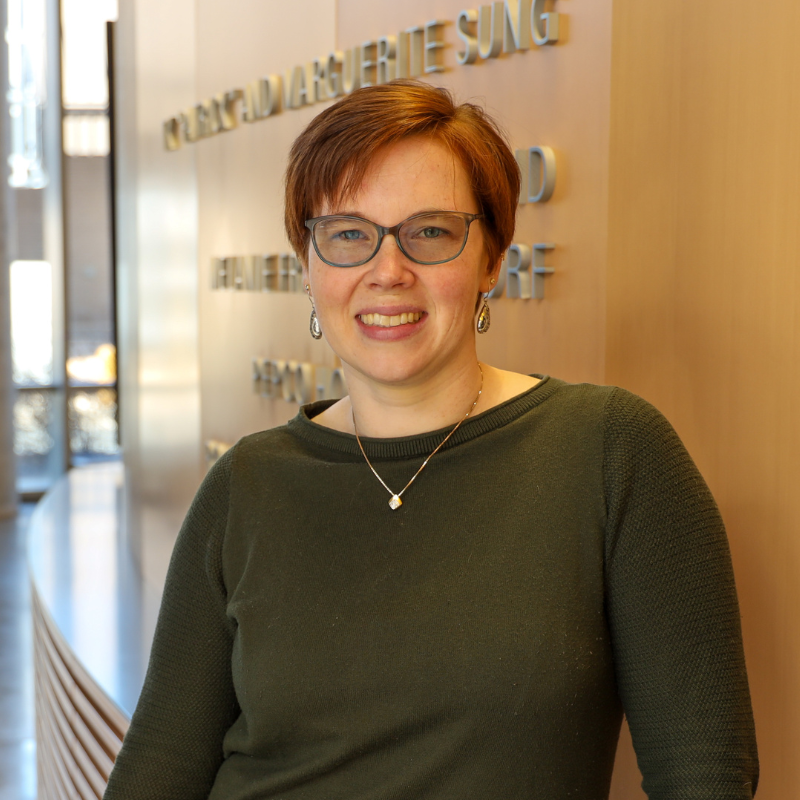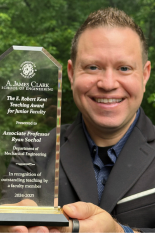News Story
BIOE Announces Fall 2023 Instructional Impact Awards
The Fischell Department of Bioengineering (BIOE) announced the three recipients of the Instructional Impact Awards for the Fall 2023 semester. Instructional Impact Award recipients are student-nominated, giving students the opportunity to recognize a faculty member, a graduate teaching assistant (GTA), and an undergraduate teaching fellow (UTF) who have positively impacted their academic experience.
BIOE Senior Lecturer Deborah Goldberg, 4th-year Ph.D. student Jake Rosvold, and senior undergraduate researcher Corinne Martin were selected as the well-deserved recipients of this past semester's awards for their strong impact on student knowledge, student skill sets, student engagement, and students’ inspiration and motivation to succeed. Read on for a Q-and-A with each instructor.
Faculty Instructional Impact Award
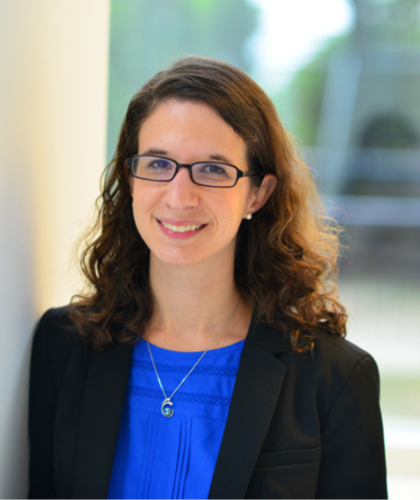 Deborah Goldberg
Deborah Goldberg
Senior Lecturer
Goldberg joined BIOE as Senior Lecturer in Fall 2023, earning the Instructional Impact Award in her first semester with the department. Prior to that, she taught for seven years in the Clark School of Engineering’s Department of Chemical & Biomolecular Engineering. In addition to her years as a Clark School faculty member, Goldberg is a Clark School alumna, having earned her B.S. in chemical engineering in 2006 and her Ph.D. in bioengineering in 2010. Between her time as a student and a lecturer, Goldberg worked as a scientist in Formulation Sciences at MedImmune (now AstraZeneca) from 2010 to 2016.
Goldberg was nominated for the Faculty Instructional Impact Award by students in both of her courses, BIOE331: Biofluids and BIOE489T: Biopharmaceutical Process Development & Manufacturing. Students unanimously agreed that they enjoyed the courses because of the efforts of their instructor. They appreciated Goldberg’s willingness to answer questions, her ability to slow down to ensure everyone understood the material, and the positive, curious learning environment that she fostered. Students also acknowledged that the structure of Goldberg’s day-to-day class, the recordings and resources she provided, and the quality and consistency of her feedback all contributed to their comprehension of the course material and their success on tests and assignments. "I am currently in Dr. Goldberg's BIOE331 class and have never had a class experience that was as enjoyable as this one due to the efforts of the professor," said one student.
How does it feel to be selected for the Instructional Impact Award?
I am truly honored to be selected for the Instructional Impact Award. I love teaching and connecting with students, and being recognized in this way is very rewarding.
What is your favorite part of being a Senior Lecturer?
My favorite part of teaching is helping students understand and connect with the material. Biofluids can be really intimidating since it's such a math-heavy course, so I try to focus on helping students understand what is physically happening in the system, giving them lots of practice to improve their problem solving skills, and connecting the material to everyday experiences. Helping a student who is struggling with a concept and seeing it "click" for them is especially rewarding. In biopharmaceutical process development, I enjoy bringing my previous industry experience at AstraZeneca to the classroom, helping students understand the challenges and considerations in designing complex pharmaceutical manufacturing processes within the regulatory and economic constraints of industry. It's incredibly rewarding when students reach out to let me know how well my class prepared them for their internship or job in the biopharmaceutical industry.
How do you connect with the students you work with?
I strive to create a positive and engaging classroom environment where students feel comfortable participating and asking questions. Outside of the classroom, I enjoy having more individualized interaction with students in office hours, and also organize "learning communities" where students meet in Clark Hall to work on homework assignments and I go around and answer questions. I really value meeting with students one-on-one to discuss more individualized needs, from study strategies to applying to graduate programs.
GTA Instructional Impact Award
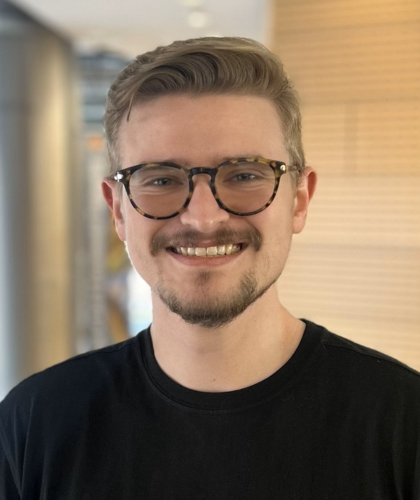 Jake Rosvold
Jake Rosvold
4th-Year Ph.D. Student
Rosvold is a 4th-year Ph.D. student researcher in the Optics Biotech Laboratory, headed by Associate Professor Giuliano Scarceli. Rosvold’s research focuses on designing optimal source and detection schemes for next-generation, nonlinear microscopy. More specifically, his thesis—which he is preparing to defend this Summer 2024—is on enabling stimulated Brillouin scattering spectroscopy for rapid processing of biomechanical properties. Following his successful defense and graduation, Rosvold plans to attend law school in order to become a patent attorney.
Rosvold was nominated for the GTA Instructional Impact Award by students in BIOE371: Linear Systems and Ordinary Differential Equations for Bioengineering Applications. In their nominations, students spoke at length about Rosvold’s exceptional commitment to his responsibilities as a GTA, noting his willingness and patience to answer questions, his ability to turn confusing topics into understandable content, and his helpful one-on-one office hours. Several students said that their success in the course was thanks to the high-quality instruction by Rosvold. They appreciated his exam prep, his ability to make students feel valued and heard, and his interest in helping advance their success outside of the classroom by supporting networking and internship searches. One nomination said, “He is truly one of a kind. It has been an honor to be working alongside such a hardworking intelligent person.”
How does it feel to be selected for the Instructional Impact Award?
I am genuinely honored to be recognized this way. Mentoring students is a pivotal role that goes beyond communicating the coursework; it is an opportunity to share experience and provide guidance towards personal and professional growth. To receive this award is further confirmation that my efforts to 'teach a way of thinking’' was successful.
What is your favorite part of being a TA?
My favorite part of being a TA is translating complex ideas. Being a TA requires the ability to translate complex topics and problems into digestible ones. Seeing students tackle large problems by breaking them down into smaller, solvable parts with the tools they’ve acquired throughout the semester is a sign of growth and learning—a sign my job as a TA is complete. I love seeing the ‘Aha moment’ when previously daunting problems become not-so-scary and the students demonstrate their confidence with problem solving.
How do you connect with the students you work with?
I connect with the students in a number of ways: showing them mutual respect (this fosters confidence and breaks down the initial fears of asking questions); rephrasing problems into real-world applications (this contextualizes what is being taught with how it can be used in practice); providing advice towards nontraditional career paths and networking (this shows the students the vast options they have in their career choices and professional development); teaching the students ‘a way of thinking’ (I can’t stress enough how important this is—understanding the ‘why’ behind 2+2=4 is what makes us successful problem-solvers as opposed to calculators with student debt).
UTF Instructional Impact Award
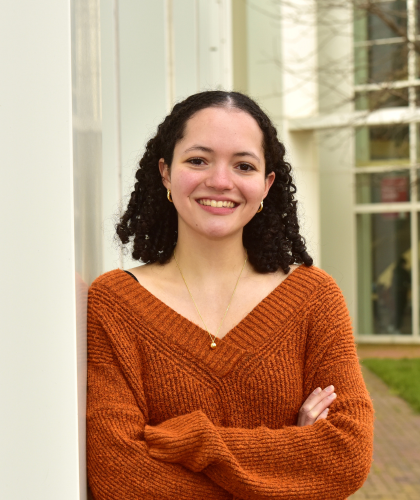 Corinne Martin
Corinne Martin
Undergraduate Researcher, Senior
Martin is a senior undergraduate researcher in the Jewell Research Lab, headed by MPower and Minta Martin Professor Christopher Jewell. Selected for the BIOE Honors Program, Martin works in the Jewell Lab to conduct research on immune engineering for her undergraduate honors thesis. This past summer, Martin interned at Genentech on the Molecular Genetics Team, which develops, advances, and optimizes gene-editing technologies that support the drug development efforts at the company. After graduating with her B.S. in bioengineering, Martin plans to pursue a Ph.D. in bioengineering and lead an academic research lab focused on immune engineering to advance novel therapeutic strategies for autoimmune diseases, such as Crohn’s disease.
Martin was nominated for the UTF Instructional Impact Award by students in BIOE120: Biology for Engineers, for which Martin led the discussion section. Students praised her thorough and thoughtful explanations of course material, and felt that her approach to their Friday morning discussions effectively advanced their understanding of the content. Students appreciated her patience and strong interpersonal skills, and felt comfortable coming to her with questions. They also praised her dedication to being present and available, both during and outside of regular class time. “She is very thorough and great at explaining and answering any questions that I had,” said one nomination. “She is patient with every student and makes sure that we all feel included.”
How does it feel to be selected for the Instructional Impact Award?
I'm incredibly honored that the students and professors I've worked with consider me to have had a positive impact as a TA. I love teaching and mentoring, and the goal of any teacher or mentor is to have a positive impact on their students, so I'm very excited to hear that my students gained something from having me there.
What is your favorite part of being a TA?
My favorite part of being a TA is getting to support students at the start of their scientific journeys. BIOE120 was the first college biology course I ever took, and that's the same case for many of my students—which can make it a daunting experience! I love getting to be the one to help make complex concepts less intimidating and give students the confidence to continue in STEM. Working one-on-one with a student during office hours or discussion and seeing the moment when their understanding finally clicks is one of the best feelings I have as a TA.
How do you connect with the students you work with?
It's really important to me to use my experiences to offer advice to younger students who are interested in getting involved in research or finding internships, or who are just looking for guidance. I like to make myself known as someone who they can always come to for advice, and I love chatting one-on-one with students about research and internship opportunities. It's especially meaningful to connect with female and minority students like myself and help them at the start of their foray into research or other scientific careers. As a biracial woman pursuing research in bioengineering, it's important to me to actively support their representation in the field, and to help embody representation for these students who may not have historically seen themselves represented in the field that they're trying to enter.
Published January 17, 2024

